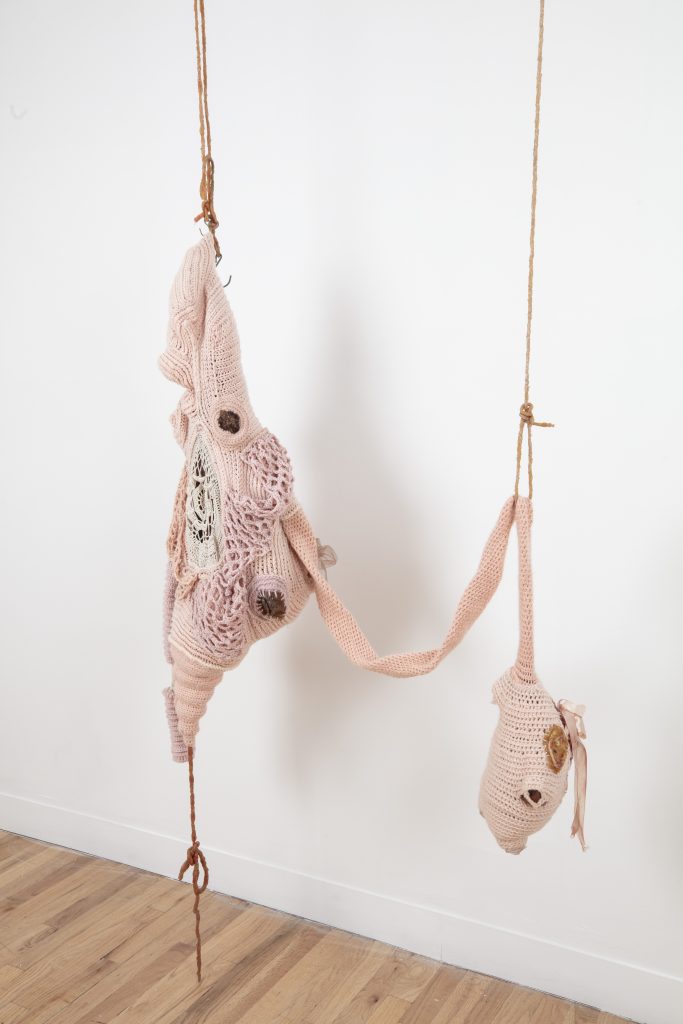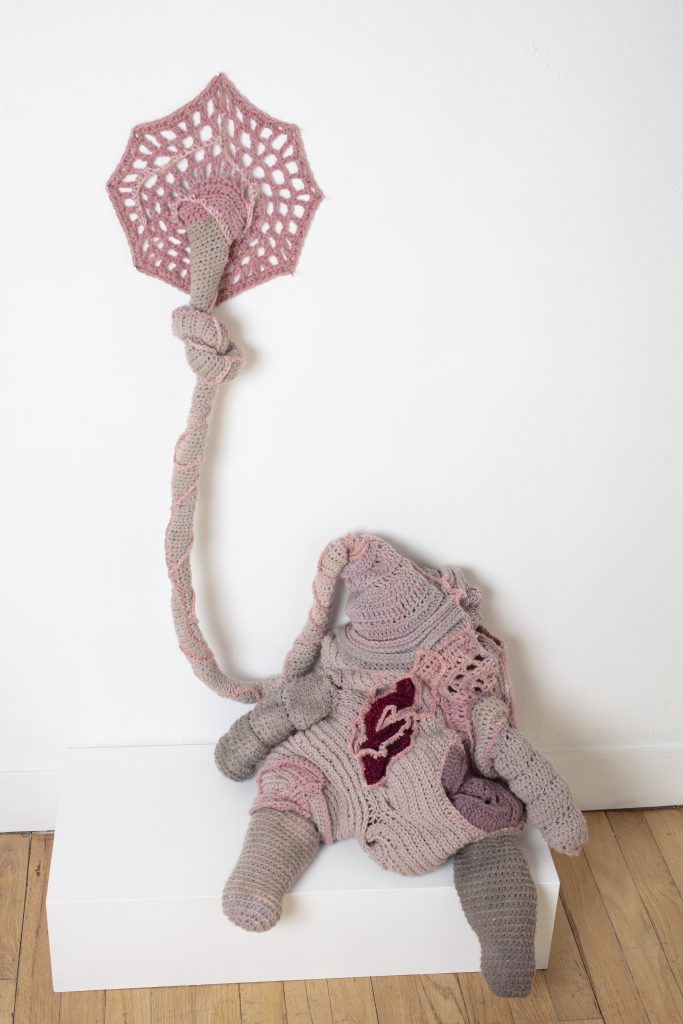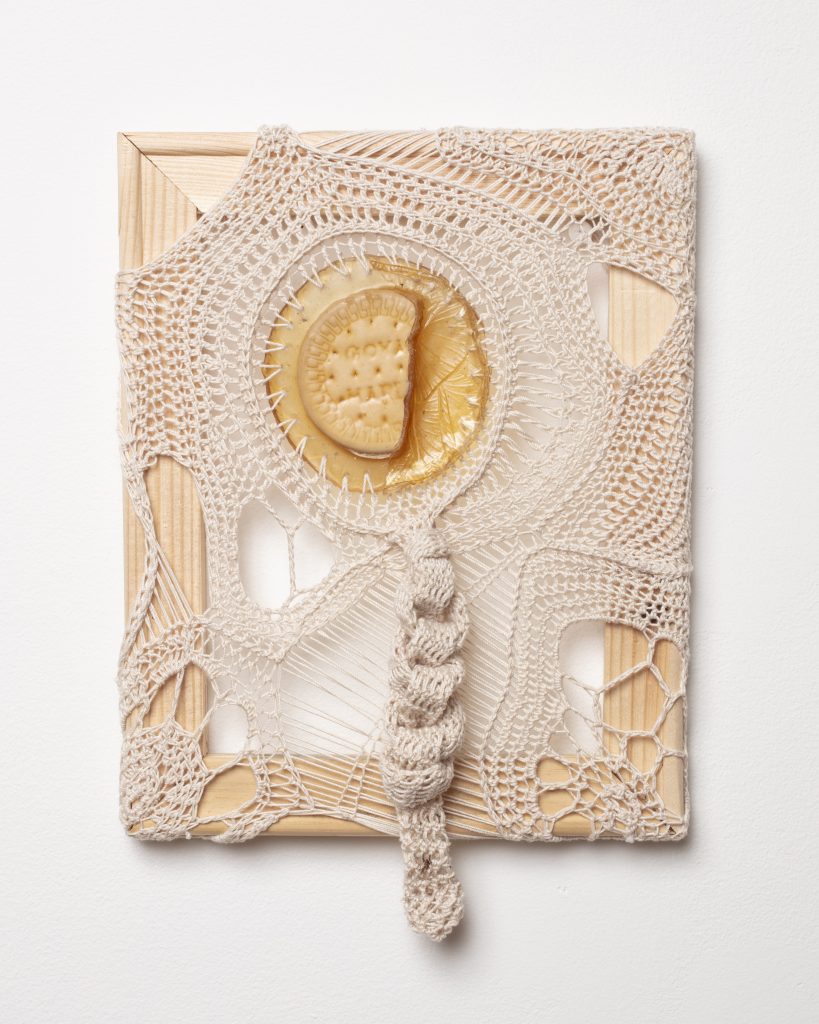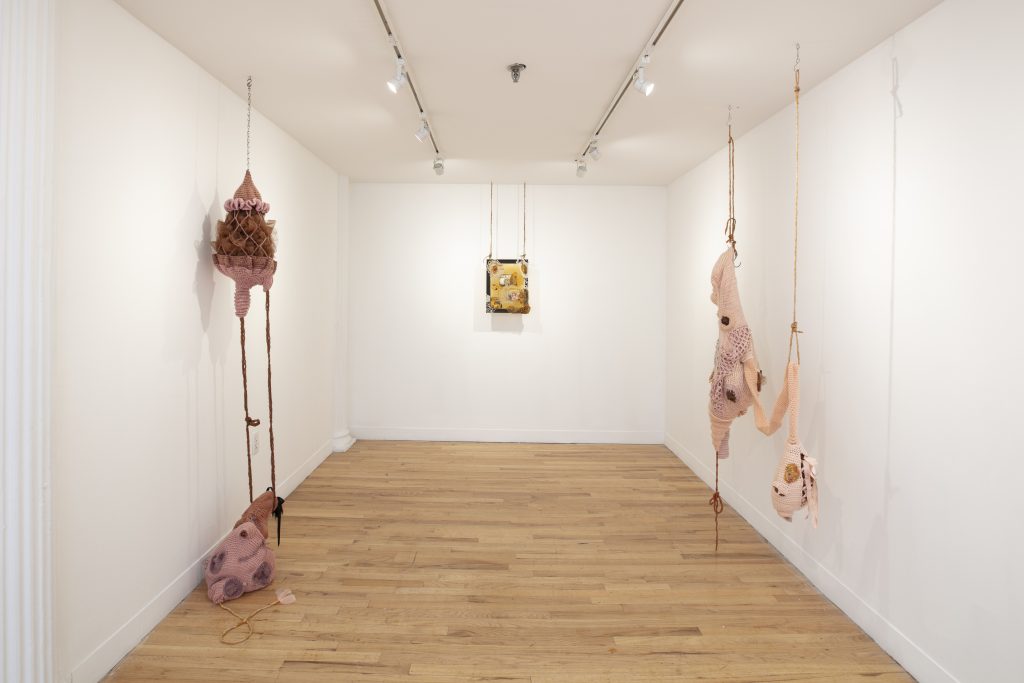“We’re just so glad you’re home.”
That’s the title of a new exhibition at 81 Leonard Gallery in New York City from multi-disciplinary artist Ophelia Arc, who’s currently pursuing her MFA at the Rhode Island School of Design, and though it took me a while to make it to the gallery, I was taken in from the moment I first read it.
Though just a part of the materials in Arc’s work on display, central to this snapshot of her practice is a series of textile pieces, some of which Arc gives three-dimensional form to the point of looking like living beings.
Standout example “neglected experimental animal I” (2023) doesn’t quite resemble animals we’re used to seeing, instead presenting a figure with clearly defined limbs and other bodily components, all of which connect to a crocheted cord (you might imagine an umbilical cord) leading to a web of sorts splayed on the adjacent wall, while the “experimental” creature itself rests on a pedestal that’s quite low to the ground.
Crocheting a Universe
Here and elsewhere, Arc prioritizes crochet to actually give things form. This particular piece resembles a child’s imaginary friend who was given real-world shape and now rests in the moment of its creation and original companionship, now frozen indefinitely.
The crocheting puts intricate, snaking, sometimes quivering lines (of yarn) at the center of the pieces utilizing the method, which by its form already starts amplifying the feeling that these pieces arise from somewhere personal, intimate, and drenched in emotion. The tone of the sculpturally slanted, crocheted strands feels like a beating heart as the patterns twist, curve, and grow into forms that somehow exist both in recognition and outside of it.
Hanging piece “my second biggest hollow space” (2023) — whose materials list includes hand dyed yarn, thread, tulle, latex, dead bugs, ribbon, and a septum ring — features two figure-like components hanging separately but connected again by an umbilical cord-suggesting link, with the whole thing connecting in turn to the ceiling above. The figure-like components are bulbous, evoking in their form the free-flowing curvature of our actual human bodies.
Parts of the textile constructions that fit more loosely together leave space for imagined organs, as though cradling not a physical heart but the idea of it — the delicate power that we tend to associate with that actual bodily area and that, no matter the origin, drives us while carrying its own weight from embedded experiences.

Memory, Turned into Something Tangible
While walking through Arc’s exhibition, I was contemplating the strained intricacy of memory, which Arc’s pieces were moving towards with startling clarity. She presents a memory-world in which there are gaps and the entire environment seems constantly in motion in a manner perhaps only representable by these artfully assembled textiles.
It’s all shifting and held by some unseen force at a distance, somewhere that we will never again be able to fully inhabit because of the nature of the passage of time, moving indefinitely forward. Threads of it connect to us in our present moment in a manner outside our control, reflected by the unpredictable but life-suggesting manner in which Arc’s pieces take shape and move forward. But part of it is gone, and Arc’s works suggest a compelled vantage point of watching it slip.
The body-suggesting forms of some of Arc’s pieces reflect with captivating precision an interchange between these threads from slipping memories and our real-world physical presences. It’s not so much a separate weight in the universe of these works as it is integral to the most central parts of our interactions with and experiences of the wide-ranging environments that we encounter.
The separation between individual components in the multi-focal point textile works hanging from the ceiling presents a vision of drifting alienation looping back on itself, never reaching a full break, as the rounded overall forms keep things more free-flowing while those connective strands between physically separated areas work their magic. The looping links between different areas of concentrated textile seem to bring the empty space surrounding the pieces into their universe, putting the individual artworks adrift in a sea of non-definition.
Images, Taken Further
Another part of Arc’s oeuvre on display is a series of assemblages-of-sorts using the form of a picture frame as underlying skeletons. A selection of those featured Goya cookies submerged in latex and then crocheted into place in textile patterns that freely shifted between tighter networks and arrangements leaving more empty space. The pieces explored a depth behind presentations of images, spotlighting a facet to these (that transfers into our mental experiences of living) where things just aren’t as solid as you might have been conditioned to expect.
Instead, you might start thinking of our mental self-images as formed from wildly disparate parts that seem directionally propelled from within and originate from outside ourselves. Arc puts some of the same free-flowing artistic methods from the more sculpturally oriented pieces into these image-suggesting contexts, making the jump to internal, mental images a relatively easy transition.
Though trauma in terms of a perhaps sudden, jarring break or impact feels like an undercurrent at times, Arc’s stance is clearly observational and looking towards the entirety of what it means to experience such a thing in the first place, whether something more unique to an individual or general disillusionment shared by many. She adeptly illuminates pathways on which these things operate and populates the journey with a cast of characters for whom the compassion emanates with ease, allowing an easy look at your own self through amplified empathy.
Arc’s “we’re just so glad you’re home” (curated by Nakai Falcón) continues at 81 Leonard Gallery in Manhattan through June 1 (see info here), and I am looking forward to what’s next from both the artist and the art gallery.


Featured image: Ophelia Arc; “we’re just so glad you’re home,” installation view (2024). Image courtesy of 81 Leonard Gallery.
You may also like
-
Diana Kurz at Lincoln Glenn in New York: A Review of a Shining Art Exhibition
-
Dustin Hodges at 15 Orient in New York City: An Ensnaring Exhibition at an Exciting Gallery
-
Maren Hassinger at Susan Inglett Gallery in New York: Reviewing an Uplifting Art Exhibition
-
Enzo Shalom at Bortolami in New York City: Reviewing an Entrancing Exhibition of Paintings
-
“Ben Werther: Townworld” at Amanita in New York City: Reviewing a Richly Memorable Art Exhibition
